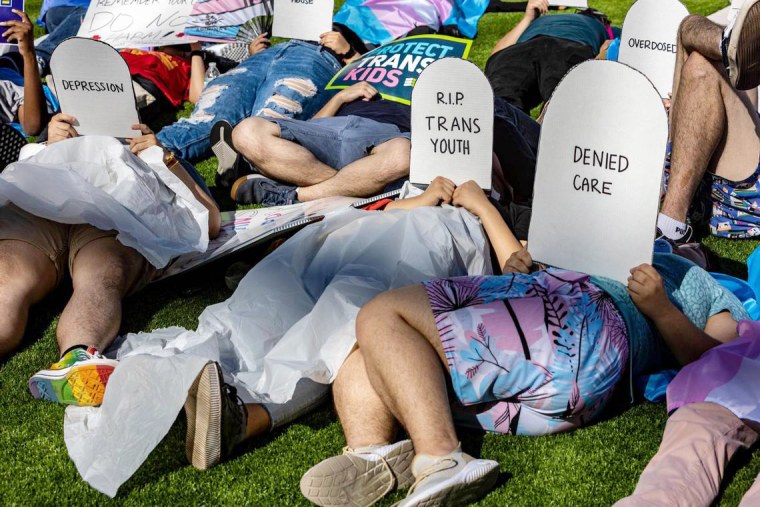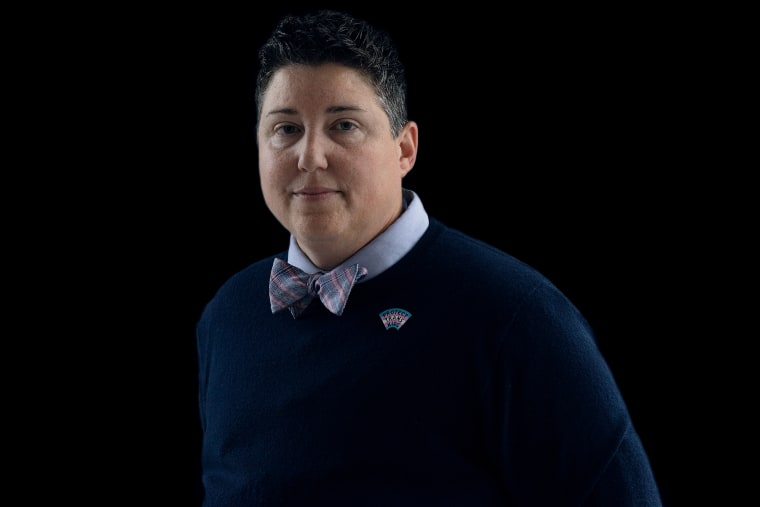HHS moves to slash funding and access to care for transgender minors
The Trump administration announced Thursday that it would begin to take steps aimed at ending transition-related care — or what the Department of Health and Human Services has termed “sex-rejecting procedures” — for minors nationwide.
The proposals — which, if enacted, would pull federal funding from hospitals that offer transgender care to minors — are the latest effort by the administration to restrict access to certain transgender care.
Doctors across the country “provide needless and irreversible sex-rejecting procedures that violate their sacred Hippocratic Oath, endangering the very lives that they are sworn to safeguard,” Health Secretary Robert F. Kennedy Jr. said at a news conference Thursday.
“The American Medical Association, the American Academy of Pediatrics lie that chemical and surgical sex-rejecting procedures could be good for children who suffer from gender dysphoria,” Kennedy said. “This is not medicine, it is malpractice.”
Dr. Susan Kressly, president of the American Academy of Pediatrics, said in an emailed statement that the HHS “policies and proposals misconstrue the current medical consensus and fail to reflect the realities of pediatric care and the needs of children and families.”
“Allowing the government to determine which patient groups deserve care sets a dangerous precedent,” Kressly said. “Children and families will bear the consequences.”
HHS said the Centers for Medicare and Medicaid Services will begin the rulemaking process to prohibit hospitals’ providing puberty blockers, hormone therapy and operations to minors as a condition of participation in Medicare and Medicaid and to bar Medicaid funding from being used for such care.
“We’re announcing a notice of proposed rulemaking that ends taxpayer funding of sex-rejecting procedures for children in Medicaid and CHIP, full stop,” said CMS Administrator Dr. Mehmet Oz. “We’re not going to let taxpayer money go to hurt these children.” The Children’s Health Insurance Program is a federally funded program for uninsured kids.
Dr. Kenneth Haller, a pediatrician based in St. Louis, called HHS’ actions “anti-science” at a briefing Tuesday held by the Human Rights Campaign, the nation’s largest LGBTQ advocacy group. He said efforts to restrict access to such care still allow the treatments for children with other conditions that affect hormone production, for example.
As long as the treatments affirm a child’s birth gender, Haller said, “these people don’t have a problem with it.” He added, “That same care for kids who are transgender is what they say is wrong. There’s no science behind it.”
HHS also announced that the Food and Drug Administration will issue warning letters to 12 manufacturers and retailers of breast binders for minors for the purposes of treating gender dysphoria, which is the distress that results from a misalignment between a person’s gender identity and birth sex, alleging that the manufacturers are participating in illegal marketing.
HHS’ Office for Civil Rights proposed a revision to Section 504 of the Rehabilitation Act of 1973, which prohibits discrimination in federally funded programs, to clarify that the definitions of “disability” exclude gender dysphoria that does not result from physical impairments. The proposed revision “clarifies” for HHS funding recipients that “policies preventing or limiting sex-rejecting procedures do not violate Section 504’s disability nondiscrimination requirements,” the agency said in a statement.
The proposed CMS rules and revision to Section 504 will be finalized after a 60-day and 30-day comment period, respectively, according to an HHS spokesman.
The Trump administration has worked to restrict access to transgender care since President Donald Trump returned to office in January.
In the first few weeks of his second term, President Donald Trump issued multiple executive orders targeting trans people, including an order declaring that there are only two unchangeable sexes and another barring federal fundingfrom going to hospitals that provide transition-related care to minors. In May, HHS released a review declaring that the quality of evidence regarding the effects of gender-affirming care for minors “is very low,” breaking with the majority of U.S. medical associations, which support access to such care and have condemned efforts to restrict it.
The Trump administration’s policies built on an increasingly restrictive environment for trans care. In the last few years, 27 states have enacted measures prohibiting access to certain transition-related treatments for minors, according to Movement Advancement Project, an LGBTQ think tank. Families who could afford it began traveling to the remaining states where care remained legal.
But in July, the federal government began investigating providers across the country, resulting in more than 20 hospitals — including those in liberal cities such as Los Angeles and Boston — rolling back or ending their gender-affirming care programs for minors and some young adults.

The environment has led some trans adults and families with trans children, like the Gonzales’, to leave the country. Rachel Gonzales’ three children are fifth-generation Texans, and she has been fighting anti-trans legislation in the state since her trans daughter, Libby, was 6 years old. For years, she has said they had no plans to leave the state. But due to the federal government’s actions to restrict access to transition care, she and her husband moved Libby, who is now 15, and their other two children out of the United States to a country Gonzales declined to disclose.
“Living in Texas, we became targets of politicians who have boldly rejected the consensus of medical experts and decided that they know better than Libby, my husband and I, and our team of physicians and have opted to use us as their political targets, instead of allowing us the parental rights that they so claim to advocate for,” Gonzales said during the press briefing held by the Human Rights Campaign.
An estimated 724,000 youth ages 13 to 17 — about 3.3% of all American youth in that age group — identify as transgender, according to an analysis of Centers for Disease Control and Prevention data from the Williams Institute at UCLA.
An even smaller percentage of that group access transition care, according to research.
A study published this year in JAMA Pediatrics found that less than 0.1% of adolescents ages 8 to 17 — or about 5,100 — with private insurance in the United States are transgender or gender diverse and are prescribed puberty blockers or gender-affirming hormones. The study also found that no patients under 12 were prescribed hormones.
A 2024 study published in JAMA Network Open found that the rate of teens ages 15 to 17 undergoing gender-affirming surgery was 2.1 per 100,000.
Just a day before the HHS announcement, the House passed a bill that would charge doctors with a felony punishable by up to 10 years in prison if they provide gender-affirming care for minors. The legislation, introduced by Rep. Marjorie Taylor Greene, R.-Ga., is expected to die in the Senate but marks the harshest federal penalty for doctors providing transition-related care to minors ever passed by the House.
Greene called the bill’s passage “a win for children all over America” on X on Wednesday.
Rep. Dan Crenshaw, R.-Texas, introduced another bill the House will vote on Thursday that would prohibit Medicaid from covering gender transition procedures for anyone under the age of 18.







